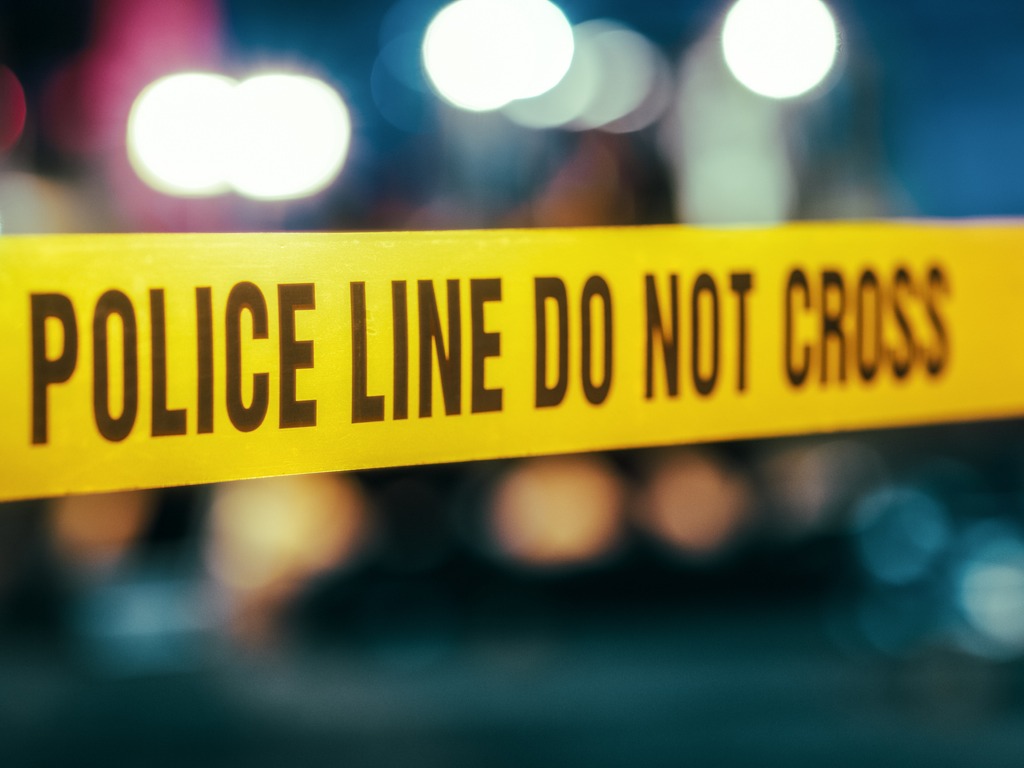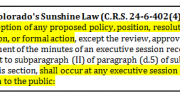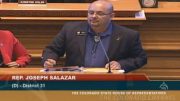Update: An amended version of HB 24-1460 died in the House on a 31-33 vote on Friday, May 3. See this blog article.
By Jeffrey A. Roberts
CFOIC Executive Director
A bill narrowly passed by a Colorado House committee Tuesday night includes a provision that prohibits law enforcement agencies from charging fees for unedited body-worn camera footage released to the public under the 2020 Law Enforcement Integrity Act.
The language in House Bill 24-1460 addresses demands by the Boulder Police Department and some other agencies for hundreds or thousands of dollars before providing video of incidents in which there is a complaint of officer misconduct.

A lawsuit filed earlier this month by Yellow Scene Magazine challenges the Boulder PD’s insistence that the news organization pay the agency nearly $3,000 to get footage of officers shooting and killing a 51-year-old woman last December. While the Colorado Criminal Justice Records Act (CCJRA) permits the charging of fees for the search, retrieval and redaction of criminal justice records “pursuant to part 3” of the statute, lawyers for Yellow Scene point out that the magazine’s request was made pursuant to C.R.S. § 24-31-902(2)(a), which has no fee provision.
If HB 24-1460 becomes law, law enforcement agencies would not be allowed to charge fees “related to the unedited video and audio recordings of an incident,” notwithstanding the fee provisions in CCJRA and the Colorado Open Records Act.
Members of the House Finance Committee, before passing the bill 6-5, also approved an amendment clarifying that the footage-release requirements in the Law Enforcement Integrity Act apply to officer-involved shootings as well as “incidents in which there is a complaint of peace officer misconduct.”
Sponsoring Reps. Leslie Herod and Jennifer Bacon, both Denver Democrats, added the provision at the request of the Colorado Freedom of Information Coalition, which last year documented three instances in which agencies denied journalists’ requests for body-cam footage of officer-involved shootings because there had been no official complaint of misconduct. Disclosure would be “contrary to the public interest” under CCJRA, the agencies determined.
That is how law enforcement agencies could treat all police body-cam and dashboard-camera footage prior to the enactment of Senate Bill 20-217 and follow-up provisions in House Bill 21-1250.
Under the 2020 law, all unedited video and audio recordings of incidents “in which there is a complaint of peace officer misconduct … through notice to the law enforcement agency involved in the alleged misconduct” must be released to the public no later than 21 days after a request is made. An agency can delay the release of video until 45 days from the date of an allegation of misconduct if the video “would substantially interfere with or jeopardize an active or ongoing investigation.”
Redactions are allowed if a video “raises substantial privacy concerns” for criminal defendants, victims, witnesses, juveniles or informants. This could include video depicting nudity, a sexual assault, a mental health crisis or a medical emergency.
The footage requested by Yellow Scene concerns the Dec. 17, 2023, shooting of Jeanette Alatorre near the North Boulder Recreation Center. In emails provided to CFOIC, a Boulder PD communications specialist told managing editor Austin Clinkenbeard the agency would be “blurring/muting portions of the records as contrary to public interest” under CCJRA “because the information could reasonably be expected to constitute (an) invasion of personal privacy for individuals who could be affected by its disclosure.” The estimated cost of fulfilling the request: $2,857.50, which the department wanted paid in advance.
“How could any media afford these kinds of fees?” Yellow Scene publisher Shavonne Blades said to lawmakers during Tuesday’s committee hearing. “Based on the history of the Boulder Police Department, we would need a surplus budget in the tens of thousands (of dollars) just to honestly report on the volume of complaints brought against the department.”
Yellow Scene attorney Ashlyn Hare testified that Alatorre’s daughter also was quoted a fee to obtain body-cam footage of the shooting. “It is unjust that (she) must pay the very entity that killed her mother to obtain footage of her killing.”
The body-cam provision in HB 24-1460 is just one portion of the bill, which is aimed at protecting law enforcement whistleblowers. Several police and sheriff’s officials testified against it Tuesday, many complaining they weren’t included in the stakeholder process before the bill’s introduction on Apr. 17.
Some members of the House Judiciary Committee expressed concerns about the stakeholder process and didn’t guarantee their support for the bill on the House floor.
Follow the Colorado Freedom of Information Coalition on X (formerly Twitter) @CoFOIC. Like CFOIC’s Facebook page. Do you appreciate the information and resources provided by CFOIC? Please consider making a tax-deductible donation.




